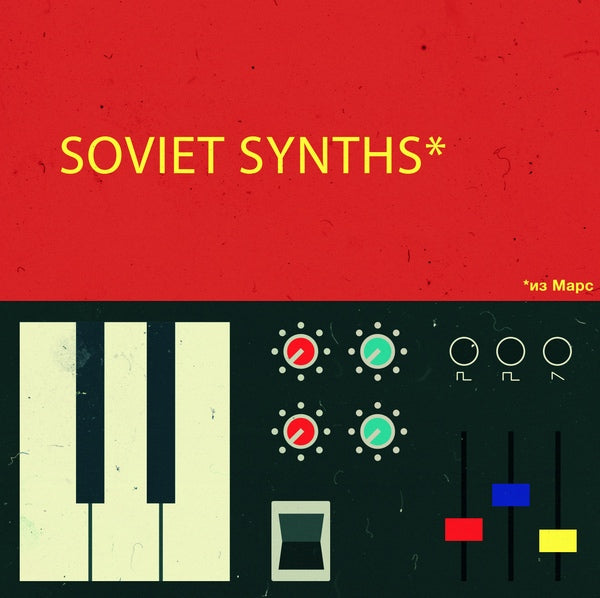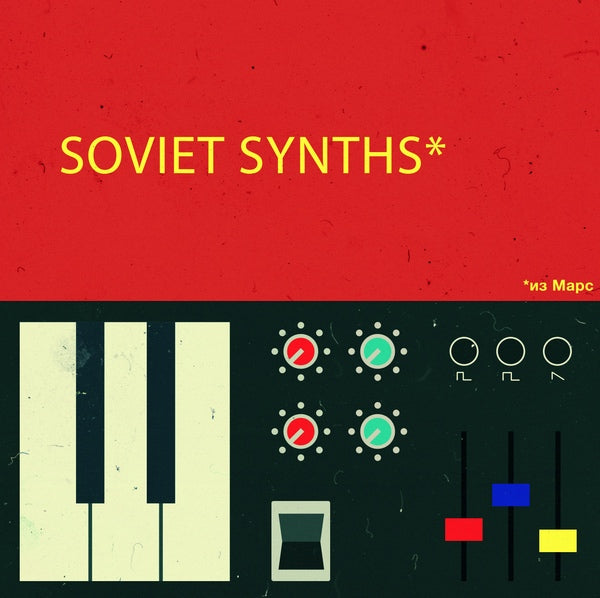SOVIET SYNTHS FROM MARS
$39.00 $19.50
Esoteric and Characterful Synthesizers from Behind the Iron Curtain
In the 70s and 80s, the Soviet Union produced dozens of funky, raw, and wonderfully characterful synthesizers. Because the USSR was detached from the West's exploding synthesis technologies, these machines bore their own mark that made them uniquely different than anything else produced in that era.
We've always admired the unique, aesthetic beauty of these synths from afar, but were hesitant to try them, since their reputation for being heavy, finicky, hard to service, and expensive to ship has made them an intimidating purchase for the average electronic musician.
Putting our hesitation aside, we bit the bullet and ordered six classic Soviet Synths, and three drum synths. Some took over four months to arrive and others arrived needing repair, but luckily, their sound did not fail to impress. What we found is that, despite their cold exterior, these synths are capable of warm, deeply analog, characterful tones, and of course: meaty and cold psychotic mayhem.

A History of ADSRs in the USSR
In the 1970s there was no real audio industry in the USSR; the state controlled almost all aspects of production, and there were no bespoke music technology companies to create instruments that Russian electronic musicians could use. Instead, state-owned plants simply manufactured equipment as part of a broad program to increase the overall volume of goods produced for the people. A plant would manufacture anything from military grade radios to, you guessed it, synthesizers! As a result, many of these synths are built, literally, like tanks—cold, heavy and able to take (and give) a beating!

Fortunately, many of Russia's brightest engineers were quite passionate about music technology and designed their own versions of synths to contribute to the state's quota of manufactured goods, despite the lack of demand for them (the average Soviet citizen simply could not afford them).
Since American and Japanese gear was hard to come by, these engineers would borrow synths from touring western bands in order to learn new technologies and incorporate them into their synth designs. This explains why some Soviet synths, despite their unique nature, have some shared electro-genetic traits with western counterparts.
The Sound
Not surprisingly, this unique time period resulted in synthesizers that sound like nothing else in the world. Each of them has its own distinct sonic trademark - from militant acid bass to retro pads, warbly, and soft chords, to dusty strings, lo-fi clarinets, psychotic modulations and so much more:
The Formanta Polivoks: Dirty and Menacing
The Polivoks is by far the most popular Russian-made synth, and for good reason. It features two hefty oscillators, with pulse waveforms, cross FM modulation and a noise generator. These are held together in a massive aluminum case, is controlled by massive knobs:

The oscillators on this thing are insane; they're reminiscent of a Memorymoog and Prophet 5's bastard love child—menacing, unstable and pissed off. Add some modulation and together they make for a sonic nuclear explosion, which is probably why it was chosen for the creepy sound design of Doom (the video game).
But above all its other unique features, The Polivoks is best known for its massive, unapologetically dirty and fat filter. Give it a little push and it howls like wolves during a hunt.
The Aelita: Cold and Deadly Resonance
The Aelita is a three oscillator synth with basic but pronounced features, housed in a massive metal case that's juxtaposed by colorful, horizontal sliders. Make no mistake - if you drop this thing, it will split the earth in two.

Birthed in a Soviet radio manufacturing plant (it has radio buttons), the Aelita has an unparalleled, aggressive and sharp sound, shaped by its deadly resonance and "timbre control" (cutoff). This, coupled with its "strings" FX feature and a subtle vibrato, can generate some very disturbing basses, chord stabs and epic leads:
Altair 231: The People's Minimoog
The Altair 231 is a three oscillator mono synth that sports red, white and yellow knobs (all of these color schemes are so cool). If you can read Russian, you'd notice that the signal flow and features are nearly identical to a Minimoog:

But whether it's the unique Russian-made circuitry or military grade engineering, the Altair 231 does not sound much like a Moog at all. Instead, it expels a vibey sound somewhere between a 101 and a drunken 2600. It is a deeply vintage sound, and, because the samples can be used polyphonically, it can produce epic strings and pads:
Estradin 230: The Zangief of Soviet Synths
The Estradin 230 was the predecessor of the Altair 231, and it's technically identical in features and functionality. However, the Estradin 230 differs from its younger brother in that it is one of the largest monophonic synths of all time (certainly the largest we've ever played). It is basically a massive suitcase, with storage compartments embedded in the lid, and knobs that are big and trustworthy. Thankfully, the parameters are labeled in English!

This synth is capable of snappy, funky madness, but also excels at lush soundscapes and slow, juicy bass:
The Maestro: Digital Heart with an Analog Feel
The Maestro was the first hybrid digital/analog synth manufactured in the USSR. With a digital microprocessor at its core, it's capable of faithfully reproducing your favorite preset sounds, like "Flute," "Harp," and "Clarinet"... oh and "Bass" !
But despite its primitive and slightly cheesy digital processor, the Maestro's filter, effects, and arpeggio sections more than make up for its sound generator's shortcomings. The tremolo and vibrato tastefully soak the synth's output in just the right amount of sonic vodka. Its simple analog filter can generate some squelching Russian acid, and the arpeggio has a slight Crystal Castles (the Atari game) feel. It can generate some nasty pad-like glitchy textures when the rate is bumped up!
Tom 1501: Gulag Orchestra Synth
The Tom 1501 is a five part analog orchestral synthesizer with Piano, Clav, Alto, Violin and Brass sections. We've played a lot of these types of synths over the years, but the 1501 has something very distinct brewing in its electronic orchestra pit. It sounds like a warm and fuzzy sonic pie baked with Arp Solina, Crumar Performer, and a touch of Moog Opus—familiar but at the same time distant.
To enhance our favorite section of this synth (the strings, of course) we recorded to tape, at both regular speed and pitched down varispeed. The result: classic, lo-fi strings you can play your favorite melodies with:
From Russia with Drums
The USSR also made some weird percussion synths, and we felt we needed to include some of these. We focused on three: the Formanta UDS, LELL UDS and RMIF ELSITA. These machines have Simmons-style synthesis sections and architecture, but with an aggressive and lo-fi sonic twist.

To enhance the raw sonic quality of these funky little beatboxes, we ran them though some choice outboard gear. Two desks, the API 1608 and Studer 962, allowed us to achieve some needed clipping, and an assortment of compressors and saturators were used for additional punch and coloration. This allowed us to build an assortment of Drum Synth one shots, thus completing our Soviet sampling session.
In the End
After admiring these synths for years, too nervous to pull the trigger because we had no clue what they sounded like or whether they'd get broken in shipping, the consensus is clear: despite their cold, machine-like exterior, these synths have a wonderful amount of warmth, soul, and characterful drift. But make no mistake - they are still capable of ice cold bass, psychotic leads and downright strangeness.
The resulting sample pack captures the charm, grit and diversity of the Soviet electronic sound in the most musical and useable way possible. By focusing on each synth's specific strengths (and neglecting their weaknesses), you get the best of everything. From basic waveforms to bizarre pads of disarray, we hand sampled 50 presets (many with multi-sampled synth parameters) and created a drum instrument loaded with meticulously curated Soviet one shots.
And now, comrades, we are at last ready to share them with you. May the sounds of the soviet synths take your productions to new, cold war-inspired heights!
Contents:
- 50 multi-sampled synth presets from six vintage, Soviet era synths
- 1 Drum instrument featuring 100 Soviet Drum one shots
- Basic waveforms, chaotic leads, militant bass, retro pads, warm strings and more
- Synths sampled: Formanta Polivoks, Aelita, Altair 231, Estradin 230, Maestro and Tom 1501
- Drum synths sampled: Formanta UDS, LELL UDS and RMIF ELISTA
- Clean and processed recordings with a variety of Class A gear
- 100% hardware processing
- Extensive modulation and FX routing on all instruments
- Hand trimmed and looped to perfection
- 1.8 GB Unzipped
Ready For:
- Any 24 bit WAV Compatible DAW or Sampler
- Ableton Live 9.7+ (Not Intro)
- Kontakt 5.6.5+ (Not Kontakt Player)
- Logic 9+
- Reason 8+
- FL Studio 20.8+
Contents:
- 50 multi-sampled synth presets from six vintage, Soviet era synths
- 1 Drum instrument featuring 100 Soviet Drum one shots
- Basic waveforms, chaotic leads, militant bass, retro pads, warm strings and more
- Synths sampled: Formanta Polivoks, Aelita, Altair 231, Estradin 230, Maestro and Tom 1501
- Drum synths sampled: Formanta UDS, LELL UDS and RMIF ELISTA
- Clean and processed recordings with a variety of Class A gear
- 100% hardware processing
- Extensive modulation and FX routing on all instruments
- Hand trimmed and looped to perfection
- 1.8 GB Unzipped
Ready For:
- Any 24 bit WAV Compatible DAW or Sampler
- Ableton Live 9.7+ (Not Intro)
- Kontakt 5.6.5+ (Not Kontakt Player)
- Logic 9+
- Reason 8+
- FL Studio 20.8+










